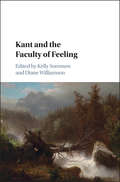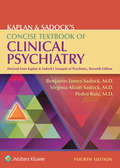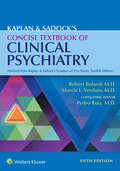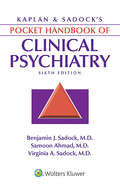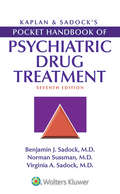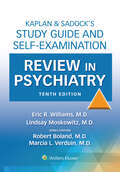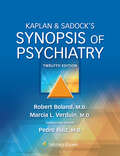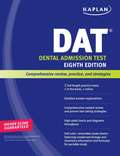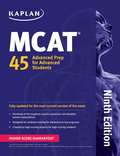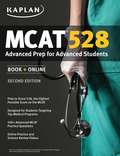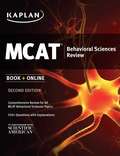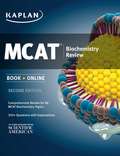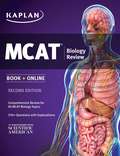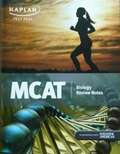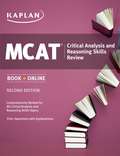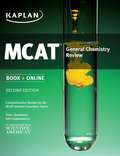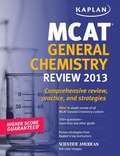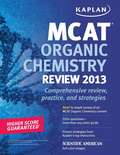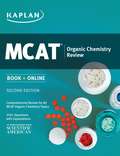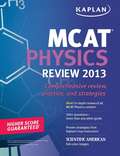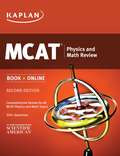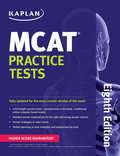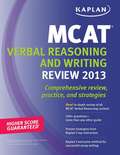- Table View
- List View
Kant and the Faculty of Feeling
by Diane Williamson Kelly SorensenKant stated that there are three mental faculties: cognition, feeling, and desire. The faculty of feeling has received the least scholarly attention, despite its importance in Kant's broader thought, and this volume of new essays is the first to present multiple perspectives on a number of important questions about it. Why does Kant come to believe that feeling must be described as a separate faculty? What is the relationship between feeling and cognition, on the one hand, and desire, on the other? What is the nature of feeling? What do the most discussed Kantian feelings, such as respect and sublimity, tell us about the nature of feeling for Kant? And what about other important feelings that have been overlooked or mischaracterized by commentators, such as enthusiasm and hope? This collaborative and authoritative volume will appeal to Kant scholars, historians of philosophy, and those working on topics in ethics, aesthetics, and emotions.
Kantianism for Animals: A Radical Kantian Animal Ethic (The Palgrave Macmillan Animal Ethics Series)
by Nico Dario MüllerThis open access book revises Kant’s ethical thought in one of its most notorious respects: its exclusion of animals from moral consideration. The book gives readers in animal ethics an accessible introduction to Kant’s views on our duties to others, and his view that we have only ‘indirect’ duties regarding animals. It then investigates how one would have to depart from Kant in order to recognise that animals matter morally for their own sake. Particular attention is paid to Kant’s ‘Formula of Humanity,' the role of autonomy and the moral law, as well as Kant’s notions of practical reason and animal instinct. The result is a deliberately amended version of Kantianism which nevertheless remains faithful to central aspects of Kant’s thought. The book’s final part illustrates the framework’s use in applied contexts, addressing the issues of using animals as mere means, the ethics of veganism and vegetarianism, and environmental protection. Nico Dario Müller shows how, when furnished with duties to animals, Kant's moral philosophy can be a powerful resource for animal ethicists.
Kaplan & Sadock's Concise Textbook of Clinical Psychiatry
by Pedro Ruiz Virginia A. Sadock Benjamin SadockCompact and easy to use, Kaplan & Sadock's Concise Textbook of Clinical Psychiatry, Fourth Edition is an authoritative, affordable text that provides must-know information in clinical psychiatry. Containing the most relevant clinical material from the best-selling Kaplan and Sadock’s Synopsis of Psychiatry, Eleventh Edition, it offers step-by-step guidance on the clinical examination, the psychiatric report, medical assessment of the psychiatric patient, laboratory tests, and signs and symptoms, as well as all psychiatric and substance-related disorders, with special chapters on children, adolescents, and the elderly. It also covers special topics such as emergency psychiatry, forensic psychiatry, ethics, and palliative and end-of-life care.
Kaplan & Sadock's Concise Textbook of Clinical Psychiatry
by Robert Boland Marcia VerduinSuccinct, authoritative, and affordable, Kaplan & Sadock’s Concise Textbook of Psychiatry, 5th Edition, provides must-know information in clinical psychiatry from the names you trust. From cover to cover, it contains the most relevant clinical material from the bestselling Kaplan and Sadock’s Synopsis of Psychiatry, 12th Edition, including the foundational chapters on assessment, the disorder specific chapters, and all of the treatment-specific chapters among other essential topics such as emergency psychiatry, ethics, and palliative/end-of-life care. New editors Robert Boland and Marcia L. Verduin, along with consulting editor Pedro Ruiz, have updated all content with a focus on reformatting and summarizing for faster access to key information.
Kaplan & Sadock's Pocket Handbook of Clinical Psychiatry
by Benjamin J. Sadock Virginia A. SadockCompletely revised to bring you up to date with current DSM-5 classifications, new medications, and more, Kaplan & Sadock’s Pocket Handbook of Clinical Psychiatry, Sixth Edition, is a concise, easy-to-use guide to diagnosing the full range of psychiatric disorders in both adults and children. Brief summaries of psychiatric disorders include key aspects of etiology, epidemiology, clinical features, and suggestions for treatment. It’s an ideal ready reference for psychiatrists and other physicians, medical students on psychiatric rotations, psychiatric residents, and mental health professionals in psychology, social work, and nursing.
Kaplan & Sadock's Pocket Handbook of Psychiatric Drug Treatment
by Virginia A. Sadock Benjamin Sadock Norman SussmanFor nearly 25 years, Kaplan & Sadock's Pocket Handbook of Psychiatric Drug Treatment has been an authoritative source of up-to-date, easy-to-find information on the full spectrum of psychiatric drug therapy. Now fully revised, the Seventh Edition of this essential guide remains the drug reference of choice for psychiatrists and other physicians, as well as psychiatric residents, medical students, clinical psychologists, psychiatric nurses, and other professionals who provide care for the mentally ill.
Kaplan & Sadock’s Study Guide and Self-Examination Review in Psychiatry
by Eric R. Williams Robert Boland Lindsay Moskowitz Marcia L. VerduinPerfect for stand-alone review or as preparation for the USMLE, PRITE in-service, ABPN Part I, and recertification examinations,Kaplan and Sadock’s Study Guide and Self-Examination Review in Psychiatry, 10th Edition, is a comprehensive, authoritative review of the entire field. Written by Drs. Eric R. Williams and Lindsay Moskowitz, this essential review tool contains more than 600 multiple-choice questions and answers, with explanatory discussions of correct and incorrect responses.
Kaplan & Sadock’s Synopsis of Psychiatry
by Pedro Ruiz Robert Boland Marcia VerdiunAccurate, reliable, objective, and comprehensive, Kaplan & Sadock’s Synopsis of Psychiatry has long been the leading clinical psychiatric resource for clinicians, residents, students, and other health care professionals both in the US and worldwide. Now led by a new editorial team of Drs. Robert Boland and Marcia L. Verduin, it continues to offer a trusted overview of the entire field of psychiatry while bringing you up to date with current information on key topics and developments in this complex specialty. The twelfth edition has been completely reorganized to make it more useful and easier to navigate in today’s busy clinical settings.
Kaplan DAT (Dental Admissions Test) (8th Edition)
by KaplanFrom the creators of the #1 DAT course, this #1 best-selling guide provides you with the targeted training you need to get the most out of your preparation and maximize your Dental Admissions Test score. This bestselling guide provides the targeted training and preparation students need to maximize their Dental Admissions Test score. Kaplan DAT features vivid color instructional charts and diagrams to make learning more memorable, two full-length practice tests with detailed answer explanations, intensive science and quantitative review, Reading Comprehension practice test, effective strategies to maximize your score, and realistic, exclusive exercises created especially for the Perceptual Ability Test. Additional features include: * An all new PAT section including the most up-to-date questions * Full-color illustrations and a 16-page pullout study sheet section * Free access to an additional full-length practice test and extra science mini-quizzes online *A full refund from Kaplan to customers who do not increase their test scores after using this book Kaplan Test Prep and Admissions has been preparing students for health sciences careers since 1963, longer than any other test prep company. Kaplan offers a wide variety of DAT preparation including online programs, books and software, classroom coaching, personal tutoring, and subject specific preparation. For information about live events, courses, and all available materials, visit kaptest. com/dat.
Kaplan MCAT 45: Advanced Prep For Advanced Students
by KaplanStudents need to have the most up to date materials and practice tests for their prep. Make sure that you're prepping with materials that reflect the changes to the MCAT that go live in January 2013! Intensive practice for each test section of the MCAT for the high-achieving student aiming for a score in the top percentile. Fewer than 40% of students who apply to medical school get accepted, and top medical schools routinely accept less than 10%. A student's MCAT score is one of the most important factors considered by the medical school admissions committee. Competitive students seeking admission to top medical schools need high MCAT scores, and therefore the most intensive MCAT practice available. Kaplan MCAT 45 features the toughest practice, strongest strategies, and the hardest questions on the MCAT. Kaplan MCAT 45 features: *The latest test information and strategies for the new MCAT. *The hardest practice sets for each MCAT subject. *Detailed answer explanations. * Focused guidelines for tackling each question type. * Time-saving study outlines for each subject . *Proven strategies for getting a high score.
Kaplan MCAT 528
by KaplanMore people get into medical school with a Kaplan MCAT course than all major courses combined. Now the same results are available with Kaplan's MCAT 528. This ebook features thorough subject review, more questions than any competitor, and the highest-yield questions available. The commentary and instruction come directly from Kaplan MCAT experts and include targeted focus on the most-tested concepts plus more questions than any other guide.Kaplan's MCAT 528 offers: UNPARALLELED MCAT KNOWLEDGE: The Kaplan MCAT team has spent years studying every document related to the MCAT available. In conjunction with our expert psychometricians, the Kaplan team is able to ensure the accuracy and realism of our practice materials. THOROUGH SUBJECT REVIEW: Written by top-rated, award-winning Kaplan instructors. All material has been vetted by editors with advanced science degrees and by a medical doctor. EXPANDED CONTENT THROUGHOUT: While the MCAT has continued to develop, this ebook has been updated continuously to match the AAMC's guidelines precisely--no more worrying if your prep is comprehensive! MORE PRACTICE THAN THE COMPETITION: With questions throughout the ebook and access to one practice test, Kaplan's MCAT 528 has more practice than any other advanced MCAT book on the market. ONLINE COMPANION: Access to online resources to augment content studying, including one practice test. The MCAT is a computer-based test, so practicing in the same format as Test Day is key. KAPLAN'S MCAT REPUTATION: Kaplan gets more people into medical school than all other courses, combined. UTILITY: Can be used alone or with other companion books in Kaplan's MCAT Review series.
Kaplan MCAT Behavioral Sciences Review
by KaplanMore people get into medical school with a Kaplan MCAT course than all major courses combined. Now the same results are available with Kaplan's MCAT Behavioral Sciences Review. This book features thorough subject review, more questions than any competitor, and the highest-yield questions available. The commentary and instruction come directly from Kaplan MCAT experts and include targeted focus on the most-tested concepts plus more questions than any other guide. Kaplan's MCAT Behavioral Sciences Review offers: UNPARALLELED MCAT KNOWLEDGE: The Kaplan MCAT team has spent years studying every document related to the MCAT available. In conjunction with our expert psychometricians, the Kaplan team is able to ensure the accuracy and realism of our practice materials. THOROUGH SUBJECT REVIEW: Written by top-rated, award-winning Kaplan instructors. All material has been vetted by editors with advanced science degrees and by a medical doctor. EXPANDED CONTENT THROUGHOUT: While the MCAT has continued to develop, this book has been updated continuously to match the AAMC's guidelines precisely--no more worrying if your prep is comprehensive! MORE PRACTICE THAN THE COMPETITION: With questions throughout the book and access to one practice test, Kaplan's MCAT Behavioral Sciences Review has more practice than any other MCAT Behavioral Sciences book on the market. ONLINE COMPANION: Access to online resources to augment content studying, including one practice test. The MCAT is a computer-based test, so practicing in the same format as Test Day is key. TOP-QUALITY IMAGES: With full-color, 3-D illustrations, charts, graphs and diagrams from the pages of Scientific American, Kaplan's MCAT Behavioral Sciences Review turns even the most intangible, complex science into easy-to-visualize concepts. KAPLAN'S MCAT REPUTATION: Kaplan gets more people into medical school than all other courses, combined. UTILITY: Can be used alone or with other companion books in Kaplan's MCAT Review series.
Kaplan MCAT Biochemistry Review
by KaplanMore people get into medical school with a Kaplan MCAT course than all major courses combined. Now the same results are available with Kaplan's MCAT Biochemistry Review. This book features thorough subject review, more questions than any competitor, and the highest-yield questions available. The commentary and instruction come directly from Kaplan MCAT experts and include targeted focus on the most-tested concepts plus more questions than any other guide. Kaplan's MCAT Biochemistry Review offers: UNPARALLELED MCAT KNOWLEDGE: The Kaplan MCAT team has spent years studying every document related to the MCAT available. In conjunction with our expert psychometricians, the Kaplan team is able to ensure the accuracy and realism of our practice materials. THOROUGH SUBJECT REVIEW: Written by top-rated, award-winning Kaplan instructors. All material has been vetted by editors with advanced science degrees and by a medical doctor. EXPANDED CONTENT THROUGHOUT: While the MCAT has continued to develop, this book has been updated continuously to match the AAMC's guidelines precisely--no more worrying if your prep is comprehensive! MORE PRACTICE THAN THE COMPETITION: With questions throughout the book and access to one practice test, Kaplan's MCAT Biochemistry Review has more practice than any other MCAT Biochemistry book on the market. ONLINE COMPANION: Access to online resources to augment content studying, including one practice test. The MCAT is a computer-based test, so practicing in the same format as Test Day is key. TOP-QUALITY IMAGES: With full-color, 3-D illustrations, charts, graphs and diagrams from the pages of Scientific American, Kaplan's MCAT Biochemistry Review turns even the most intangible, complex science into easy-to-visualize concepts. KAPLAN'S MCAT REPUTATION: Kaplan gets more people into medical school than all other courses, combined. UTILITY: Can be used alone or with other companion books in Kaplan's MCAT Review series.
Kaplan MCAT Biology Review
by KaplanMore people get into medical school with a Kaplan MCAT course than all major courses combined. Now the same results are available with Kaplan's MCAT Biology Review. This book features thorough subject review, more questions than any competitor, and the highest-yield questions available. The commentary and instruction come directly from Kaplan MCAT experts and include targeted focus on the most-tested concepts plus more questions than any other guide. Kaplan's MCAT Biology Review offers: UNPARALLELED MCAT KNOWLEDGE: The Kaplan MCAT team has spent years studying every document related to the MCAT available. In conjunction with our expert psychometricians, the Kaplan team is able to ensure the accuracy and realism of our practice materials. THOROUGH SUBJECT REVIEW: Written by top-rated, award-winning Kaplan instructors. All material has been vetted by editors with advanced science degrees and by a medical doctor. EXPANDED CONTENT THROUGHOUT: While the MCAT has continued to develop, this book has been updated continuously to match the AAMC's guidelines precisely--no more worrying if your prep is comprehensive! MORE PRACTICE THAN THE COMPETITION: With questions throughout the book and access to one practice test, Kaplan's MCAT Biology Review has more practice than any other MCAT Biology book on the market. ONLINE COMPANION: Access to online resources to augment content studying, including one practice test. The MCAT is a computer-based test, so practicing in the same format as Test Day is key. TOP-QUALITY IMAGES: With full-color, 3-D illustrations, charts, graphs and diagrams from the pages of Scientific American, Kaplan's MCAT Biology Review turns even the most intangible, complex science into easy-to-visualize concepts. KAPLAN'S MCAT REPUTATION: Kaplan gets more people into medical school than all other courses, combined. UTILITY: Can be used alone or with other companion books in Kaplan's MCAT Review series.
Kaplan MCAT Biology Review Notes
by The Staff of KaplanKaplan's successful classroom MCAT test prep experience is now replicated in this new five-book set. Each book contains commentary and advice from top Kaplan instructors and provides students with tips, strategies, and test-taking practice, as well as hundreds of practice questions, access to 3 online MCAT exams, 15 Fast Fact videos with expert advice from a top-ranked MCAT teacher, and full-color illustrations. A full-color guide featuring all-new, complete test targeted biology review for the MCAT, Kaplan MCAT Biology includes over 500 practice questions (hundreds more than the competition) and three full-length biology practice sections. Expert commentary and instruction from a top Kaplan teacher includes tips, tricks, and test expertise. Vibrant illustrations, charts, and graphs from the pages of Scientific American, make this guide a compelling source of MCAT prep.
Kaplan MCAT Critical Analysis and Reasoning Skills Review
by KaplanMore people get into medical school with a Kaplan MCAT course than all major courses combined. Now the same results are available with Kaplan's MCAT Critical Analysis and Reasoning Skills Review. This book features thorough subject review, more questions than any competitor, and the highest-yield questions available. The commentary and instruction come directly from Kaplan MCAT experts and include targeted focus on the most-tested concepts plus more questions than any other guide. Kaplan's MCAT Critical Analysis and Reasoning Skills Review offers: UNPARALLELED MCAT KNOWLEDGE: The Kaplan MCAT team has spent years studying every document related to the MCAT available. In conjunction with our expert psychometricians, the Kaplan team is able to ensure the accuracy and realism of our practice materials. THOROUGH SUBJECT REVIEW: Written by top-rated, award-winning Kaplan instructors. All material has been vetted by editors with advanced English degrees and by a medical doctor. EXPANDED CONTENT THROUGHOUT: The AAMC tests not only content knowledge, critical thinking, and critical analysis and reasoning skills, but also two other important scientific skills: research design and the execution of research, and data-based and statistical analysis. This book has expanded material to master these skills for Test Day. MORE PRACTICE THAN THE COMPETITION: With questions throughout the book and access to one practice test, Kaplan's MCAT CARS Review has more practice than any other MCAT CARS book on the market. ONLINE COMPANION: Access to online resources to augment content studying, including one practice test. The MCAT is a computer-based test, so practicing in the same format as Test Day is key. KAPLAN'S MCAT REPUTATION: Kaplan gets more people into medical school than all other courses, combined. UTILITY: Can be used alone or with other companion books in Kaplan's MCAT Review series.
Kaplan MCAT General Chemistry Review
by KaplanMore people get into medical school with a Kaplan MCAT course than all major courses combined. Now the same results are available with Kaplan's MCAT General Chemistry Review. This book features thorough subject review, more questions than any competitor, and the highest-yield questions available. The commentary and instruction come directly from Kaplan MCAT experts and include targeted focus on the most-tested concepts plus more questions than any other guide. Kaplan's MCAT General Chemistry Review offers: UNPARALLELED MCAT KNOWLEDGE: The Kaplan MCAT team has spent years studying every document related to the MCAT available. In conjunction with our expert psychometricians, the Kaplan team is able to ensure the accuracy and realism of our practice materials. THOROUGH SUBJECT REVIEW: Written by top-rated, award-winning Kaplan instructors. All material has been vetted by editors with advanced science degrees and by a medical doctor. EXPANDED CONTENT THROUGHOUT: While the MCAT has continued to develop, this book has been updated continuously to match the AAMC's guidelines precisely--no more worrying if your prep is comprehensive! MORE PRACTICE THAN THE COMPETITION: With questions throughout the book and access to one practice test, Kaplan's MCAT General Chemistry Review has more practice than any other MCAT General Chemistry book on the market. ONLINE COMPANION: Access to online resources to augment content studying, including one practice test. The MCAT is a computer-based test, so practicing in the same format as Test Day is key. TOP-QUALITY IMAGES: With full-color, 3-D illustrations, charts, graphs and diagrams from the pages of Scientific American, Kaplan's MCAT General Chemistry Review turns even the most intangible, complex science into easy-to-visualize concepts. KAPLAN'S MCAT REPUTATION: Kaplan gets more people into medical school than all other courses, combined. UTILITY: Can be used alone or with other companion books in Kaplan's MCAT Review series.
Kaplan MCAT General Chemistry Review Notes
by KaplanKaplan's successful classroom MCAT test prep experience is now replicated in this new five-book set. Each book contains commentary and advice from top Kaplan instructors and provides students with tips, strategies, and test-taking practice, as well as hundreds of practice questions, an online MCAT, and full-color illustrations. This full-color guide features all-new, complete test-targeted general chemistry review for the MCAT, as well as expert commentary and instruction from a top Kaplan teacher. Kaplan MCAT General Chemistry provides more practice questions than any other guide (over 400 questions) along with three full-length chemistry practice sections. Also included are vibrant illustrations, charts, graphs, and diagrams from the pages of Scientific American.
Kaplan MCAT Organic Chemistry Review
by KaplanKaplan's successful classroom MCAT test prep experience is now replicated in this new five-book set. Each book contains commentary and advice from top Kaplan instructors and provides students with tips, strategies, and test-taking practice, as well as hundreds of practice questions, an online MCAT, and full-color illustrations. Kaplan MCAT Organic Chemistry features all-new, complete test-targeted organic chemistry review for the MCAT exam, along with expert commentary and instruction from a top Kaplan teacher. It features dozens more practice questions than the competition (over 300 in all) along with three full-length organic chemistry practice sections, and vibrant illustrations and art straight from the pages of Scientific American.
Kaplan MCAT Organic Chemistry Review
by KaplanMore people get into medical school with a Kaplan MCAT course than all major courses combined. Now the same results are available with Kaplan's MCAT Organic Chemistry Review. This book features thorough subject review, more questions than any competitor, and the highest-yield questions available. The commentary and instruction come directly from Kaplan MCAT experts and include targeted focus on the most-tested concepts plus more questions than any other guide. Kaplan's MCAT Organic Chemistry Review offers: UNPARALLELED MCAT KNOWLEDGE: The Kaplan MCAT team has spent years studying every document related to the MCAT available. In conjunction with our expert psychometricians, the Kaplan team is able to ensure the accuracy and realism of our practice materials. THOROUGH SUBJECT REVIEW: Written by top-rated, award-winning Kaplan instructors. All material has been vetted by editors with advanced science degrees and by a medical doctor. EXPANDED CONTENT THROUGHOUT: While the MCAT has continued to develop, this book has been updated continuously to match the AAMC's guidelines precisely--no more worrying if your prep is comprehensive! MORE PRACTICE THAN THE COMPETITION: With questions throughout the book and access to one practice test, Kaplan's MCAT Organic Chemistry Review has more practice than any other MCAT Organic Chemistry book on the market. ONLINE COMPANION: Access to online resources to augment content studying, including one practice test. The MCAT is a computer-based test, so practicing in the same format as Test Day is key. TOP-QUALITY IMAGES: With full-color, 3-D illustrations, charts, graphs and diagrams from the pages of Scientific American, Kaplan's MCAT Organic Chemistry Review turns even the most intangible, complex science into easy-to-visualize concepts. KAPLAN'S MCAT REPUTATION: Kaplan gets more people into medical school than all other courses, combined. UTILITY: Can be used alone or with other companion books in Kaplan's MCAT Review series.
Kaplan MCAT Physics Review Notes
by KaplanKaplan's successful classroom MCAT test prep experience is now replicated in this new five-book set. Each book contains commentary and advice from top Kaplan instructors and provides students with tips, strategies, and test-taking practice, as well as hundreds of practice questions, access to 3 online MCAT exams, 15 Fast Fact videos with expert advice from a top-ranked MCAT teacher, and full-color illustrations. A full-color guide featuring all-new, complete test targeted physics review for the MCAT, "Kaplan MCAT Physics "includes over 500 practice questions (hundreds more than the competition) and three full-length practice sections. Expert commentary and instruction from a top Kaplan teacher includes tips, tricks, and test expertise. Vibrant illustrations, charts, and graphs from the pages of "Scientific American," make this guide a compelling source of MCAT prep.
Kaplan MCAT Physics and Math Review
by KaplanMore people get into medical school with a Kaplan MCAT course than all major courses combined. Now the same results are available with Kaplan's MCAT Physics and Math Review. This book features thorough subject review, more questions than any competitor, and the highest-yield questions available. The commentary and instruction come directly from Kaplan MCAT experts and include targeted focus on the most-tested concepts plus more questions than any other guide. Kaplan's MCAT Physics and Math Review offers: UNPARALLELED MCAT KNOWLEDGE: The Kaplan MCAT team has spent years studying every document related to the MCAT available. In conjunction with our expert psychometricians, the Kaplan team is able to ensure the accuracy and realism of our practice materials. THOROUGH SUBJECT REVIEW: Written by top-rated, award-winning Kaplan instructors. All material has been vetted by editors with advanced science degrees and by a medical doctor. EXPANDED CONTENT THROUGHOUT: While the MCAT has continued to develop, this book has been updated continuously to match the AAMC's guidelines precisely--no more worrying if your prep is comprehensive! MORE PRACTICE THAN THE COMPETITION: With questions throughout the book and online, Kaplan's MCAT Physics and Math Review has more practice than any other MCAT Physics and Math book on the market. ONLINE COMPANION: Access to online resources to augment content studying, including practice questions and videos. The MCAT is a computer-based test, so practicing in the same format as Test Day is key. TOP-QUALITY IMAGES: With full-color, 3-D illustrations, charts, graphs and diagrams from the pages of Scientific American, Kaplan's MCAT Physics and Math Review turns even the most intangible, complex science into easy-to-visualize concepts. KAPLAN'S MCAT REPUTATION: Kaplan gets more people into medical school than all other courses, combined. UTILITY: Can be used alone or with other companion books in Kaplan's MCAT Review series.
Kaplan MCAT Practice Tests (Eighth Edition)
by Inc. The Staff of KaplanThis book focuses on key subjects -specific MCAT strategies and full-length practice tests along with thorough, detailed explanations.
Kaplan MCAT Quick Sheets
by KaplanIn the "MCAT(R) Workbook," Kaplan's MCAT(R) experts have compiled the most effective practice exercises along with Kaplan's highly effective test-taking strategies. Used by itself or in combination with Kaplan's "MCAT(R) Comprehensive Review," this intensive workbook is specifically designed to help you build the critical skills you need to score higher on the new MCAT(R).
Kaplan MCAT Verbal Reasoning Review: Comprehensive Review, Practice, and Strategies
by KaplanFeatures all-new, complete test-targeted verbal reasoning strategy and essay writing review. It includes more practice questions than the competition- more than 200. Kaplan's unique five-step method for essay writing teaches students step by step how to write an effective essay in a short amount of time. Expert Kaplan teacher tips, a grammar review, and time-saving reading strategies are also included, along with six full-length practice sections and sample high level essays.
